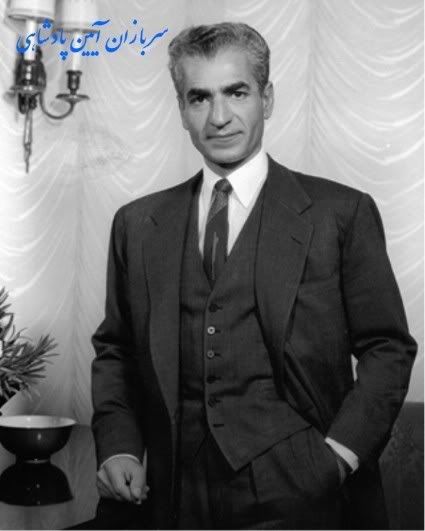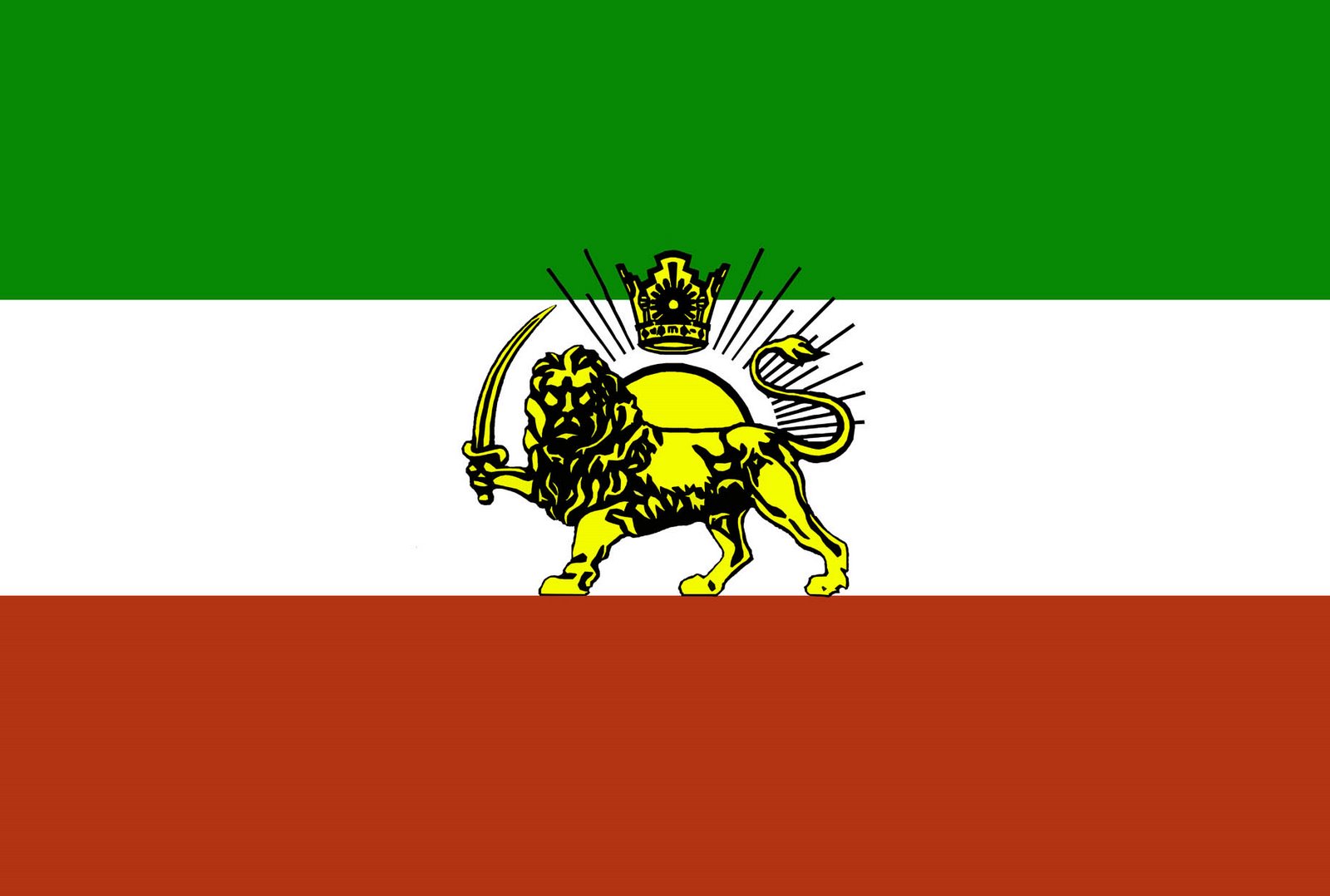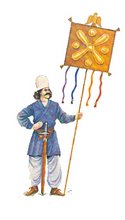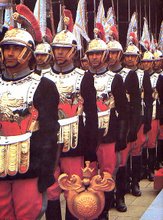
31 years ago in January 1979 these words were spoken by His Imperial Majesty Mohammad Reza Shah Pahlavi, Shahanshah Aryamehr:
"I have devoted my existence to provide them a better life. I have given land to the peasants. I have imposed our industrialists to share their profit with workers. I have developed an excellent health program and established social security. I did everything to better the standard of living of my people. I cannot order soldiers and policemen to shoot people."
"I am told today that I should have applied martial law more forcefully. This would have cost my country less dear than the bloody anarchy now established there. But a sovereign cannot save his throne by spilling blood of his fellow--countrymen. A dictator can do it because he acts in the name of an ideology which he believes he must make triumphant, no matter what the price. A sovereign is not a dictator. There is between him and his people an alliance which he cannot break. A dictator has nothing to pass on and power belongs to him alone. A sovereign receives his crown from the people..."
**************************************
In Memory Of Iran By Roger Scruton
[An American perspective]
Who remembers Iran?
Who remembers, that is, the shameful stampede of Western journalists and intellectuals to the cause of the Islamic revolution?
Who remembers the hysterical propaganda campaign waged against the Shah, the lurid press reports of corruption, police oppression, palace decadence, constitutional
crisis?
Who remembers the thousands of Iranian students in Western universities [on Pahlavi burseries] enthusiastically absorbing the fashionable Marxist nonsense purveyed to them by armchair radicals, so as one day to lead the campaign of riot and mendacity which preceded the Shah's downfall?
Who remembers the behaviour of those students who held as hostage the envoys of the very same power which had provided their 'education'?
Who remembers Edward Kennedy's accusation that the Shah had presided over 'one of the most oppressive regimes in history' and had stolen 'umpteen billions of dollars
from Iran'?
And who remembers the occasional truth that our journalists enabled us to glimpse, concerning the Shah's real achievements: his successes in combating the illiteracy, backwardness and powerlessness of his country, his enlightened economic policy, the reforms which might have saved his people from the tyranny of evil mullahs, had he been given the chance to accomplish them?
Who remembers the freedom and security in which journalists could roam Iran, gathering the gossip that would fuel their fanciful stories of a reign of terror?
True, the Shah was an autocrat. But autocracy and tyranny are not the same. An autocrat may preside, as the Shah sought to preside, over a representative parliament, over an independent judiciary, even over a free press and an autonomous university.
The Shah, like Kemal Ataturk, whose vision he shared, regarded his autocracy as the means to the creation and protection of such institutions. Why did no one among the Western political scientists trouble to point this out, or to rehearse the theory which tells us to esteem not just the democratic process, but also the representative and limiting institutions which may still flourish in its absence?
Why did no one enjoin us to compare the political system of Iran with that of Iraq or Syria?
Why did our political scientists rush to embrace the Iranian revolution, despite the evidence that revolution under these circumstances must be the prelude to massive social disorder and a regime of terror?
Why did the Western intelligentsia go on repeating the myth that the Shah was to blame for this revolution, when both Khomeini and the Marxists had been planning it for 30 years and had found, despite their many attempts to put it into operation, only spasmodic popular support?
The answer to all those questions is simple. The Shah was an ally of the West, whose achievement in establishing limited monarchy in a vital strategic region had helped to guarantee our security, to bring stability to the Middle East and to deter
Soviet expansion.
The Shah made the fatal mistake of supposing that the makers of Western opinion would love him for creating conditions which guaranteed their freedom. On the contrary, they hated him. The Shah had reckoned without the great death wish which haunts our civilisation and which causes its vociferous members to propagate any falsehood, however absurd, provided only that it damages our chances of survival.
For a while, of course, those vociferous elements will remain silent on the embarrassing topic of Iran, believing that the collapse of Iranian institutions, the establishment of religious terror, the Soviet expansion into Afghanistan and the end of stability in the region are all due to some other cause than the Islamic revolution. Those who lent their support to this tragedy simply turned their back on it and went elsewhere, to prepare a similar outcome for the people of Turkey, Nicaragua, El Salvador, Chile, South Africa -- or wherever else our vital interests may be damaged.
Of course, it is difficult now for a Western correspondent to enter Iran, and if he did so it would not be for fun. He could not, like the ghouls who send their despatches from Beirut, adopt a public posture of the front-line hero. He would have to witness, quietly and in terror of his life, things which beggar description: the spontaneous 'justice' of the revolutionary guards, the appalling scenes of violence, torture and demonic frenzy, the public humiliation of women, the daily sacrifice of lives too young to be conscious of the meaning for which they are condemned to destruction.
He would also have to confront the truth which has been staring him in the face for years, and which he could still recognise had the habit of confessing his errors been preserved: the truth that limited monarchy is the right form of government for Iran, which can be saved only by the restoration of the Shah's legitimate successor. But such a result would be in the interests not only of the Iranian people, but also of the West.
Hence few Western journalists are likely to entertain it.
























2 comments:
This is a fantastic piece by Roger Scruton. Thank you very much for finding it and posting it. But could you please mention where this appeared (newspaper, etc...) ?
Dear Aryamehr,
My name is Harrison Apple, and I am part of a project in Pittsburgh, PA, USA called Conflict Kitchen. With the assistance of the Iranian community in Pittsburgh, we will be opening an Iranian takeout restaurant that will stimulate discussion surrounding Persian culture. I had taken a look at your blog today and would greatly appreciate your input in our project.
CONFLICT KITCHEN is a public project that makes and serves cuisine from countries currently in conflict with the United States. The food is served out of a take-out style storefront, which will continually go out of business every few months and rotate identities to highlight another culture. In addition to serving food, the entire visual display, including the food, the façade of the building, and the food’s packaging, will be used as a means of distributing and communicating information that will lead to a greater awareness of the cultures and conflicts in question.
The first iteration of Conflict Kitchen will be "Kubideh Kitchen", an Iranian take-out restaurant that serves kubideh in freshly baked barbari with onion, mint, and basil. The food will be wrapped with in a poster that states eleven questions (below) that are on the minds of most Americans when asked about Iran. We would like the answers to these questions to come from YOU, Iranians living in Iran, as well as Iranians living in other parts of the world. Your answers will be posted on our blog, and some may appear on the food wrapper.
The uniqueness of this project lies in creating a way to engage in cultures that seem both geographically and psychologically distant. We read all about foreign cultures in newspapers, yet have very little personal experiences with the cultures with which we are in conflict. Food is a seductive way of being introduced to and engaging with an unknown culture and gaining access to a culture’s social customs, practices, and values.
You time and thoughtful answers would be much appreciated. Please pass this email along to others who could also assist us. You can reply to these questions by sending your answers to conflictkitchen@waffleshop.org.
Sincerely,
Harrison Apple
1. What do Iranians think of Israel? Jews? U.S.?
2. What was the Iranian revolution? What was the U.S.'s role?
3. What is the current green revolution/movement? Who are the leaders? What are they trying to achieve?
4. How is it possible that 70% of Iranians are under 30? How does this affect the culture?
5. What's the structure of Iran's government? How do people in Iran feel about their government?
6. What does being Persian mean? How is it different from being Arab? How does Iran differentiate itself from other countries in the region?
7. What's illegal in Iran that is not illegal in the U.S.? Are all laws enforced? What is the role of women in Iran, and how does the daily life of an Iranian woman compare to women in America?
8. What do Iranians think about Americans? What do Americans think of Iranians?
9. Does Iran really have the capability for nuclear weapons? Why would a nuclear-capable Iran be a threat to the United States? Is Iran developing nuclear power for energy or for weapons? Will the U.S. go to war with Iran in the near future?
10.What do Iranians eat on a daily basis? What differentiates Iranian cuisine from that of other countries in the region?
11. How does the rich history of Persian poetry play a role in the everyday life of an Iranian?
Post a Comment